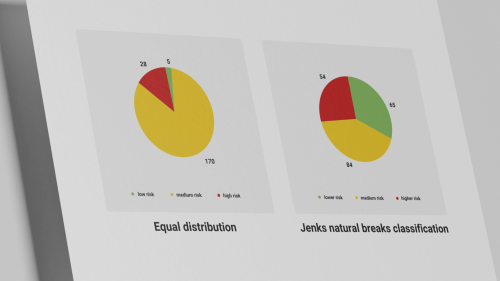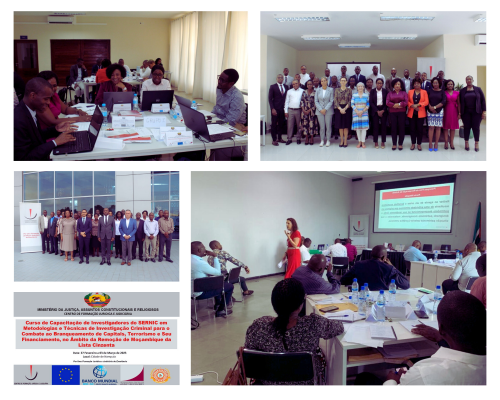How to predict "grey listing" for money laundering failures – new feature of the Basel AML Index Expert Edition Plus

The Basel AML Index Expert Edition Plus subscription (free for practically all users outside the private sector) has introduced a new feature: an approach for predicting which jurisdictions are at risk of being placed on the Financial Action Task Force (FATF) “grey list” of "jurisdictions under increased monitoring".
The grey list includes "jurisdictions with strategic AML/CFT deficiencies that present a risk to the international financial system".
The FATF states that the grey list's primary purpose is to "help protect the integrity of the international financial system by issuing a public warning about the risks emanating from the identified jurisdictions". However, others including the former FATF Executive Secretary David Lewis have emphasised that grey listing is more about putting pressure on countries to reform than about signalling risk externally.
Whatever the primary purpose is, jurisdictions are only listed after being given time to address the issues identified in their mutual evaluation reports.
Why is it important to assess the risks of grey listing?
For international financial institutions, understanding jurisdictions’ risks of being grey listed is important for strategic planning and risk mitigation. Early preparedness may prevent international financial institutions from resorting to indiscriminate de-risking and instead allow a more nuanced approach.
For the jurisdiction concerned, grey listing has a tremendously negative impact on its reputation, investment climate and trade prospects. Recent research suggests it may also impact the amount of overseas development assistance received. Being aware of the risks may strengthen efforts to prevent this from occurring.
What are the conditions?
According to the FATF’s published review process, the first step towards being grey listed is a referral to the FATF’s International Co-operation Review Group (ICRG).
The referral is based primarily on the jurisdiction’s mutual evaluation report results. Jurisdictions whose mutual evaluation report reveals a significant number of key deficiencies are referred to the ICRG for a preliminary review conducted by one of four ICRG regional review groups.
A jurisdiction can be referred to the ICRG if its MER has the following results:
- Condition 1. The jurisdiction has 20 or more Non-Compliant or only Partially Compliant ratings for technical compliance with FATF Recommendations; or
- Condition 2. It is rated Non-Compliant or Partially Compliant on three or more of the so-called “core” Recommendations: 3, 5, 6, 10, 11 and 20; or
- Condition 3. It has a low or moderate level of effectiveness for nine or more of the 11 Immediate Outcomes – key goals that an effective AML framework should achieve – with at least two lows; or
- Condition 4. It has a low level of effectiveness for six or more of the 11 Immediate Outcomes.
Poor performance in the mutual evaluation is the most frequent reason for referral to the ICRG process. However there are two possible additional reasons:
- The jurisdiction does not participate in an FATF-style regional body or does not allow mutual evaluation results to be published in a timely manner; or
- The jurisdiction is nominated by an FATF member or a FATF-style regional body. The nomination is based on specific money laundering, terrorist financing or proliferation financing risks or threats coming to the attention of delegations.
Meeting the above conditions does not automatically lead to grey listing. It only leads to an increased risk of this occurring.
What happens after referral to the ICRG?
The jurisdiction is then given a one-year “observation period” to address the deficiencies before a formal review by the FATF. If the jurisdiction’s progress is deemed insufficient, the jurisdiction may be publicly identified and placed on the grey list.
The FATF prioritises the review of jurisdictions with significant financial sectors (at least USD 5 billion in financial sector assets).
Assessing the risks of a jurisdiction being placed on the grey list
The Basel AML Index project team first analysed jurisdictions’ mutual evaluation results to identify those that fulfil the conditions for grey listing:
- Condition 1 and Condition 2 are tested using the data on technical compliance with the FATF’s 40 Recommendations.
- Conditions 3 and 4 are applied to the data on effectiveness (Immediate Outcomes).
A comparison of the results with actual grey-listed countries from 2017 to September 2023 showed that grey listing was closely linked to conditions 3 and 4. These concern the low level of effectiveness of jurisdictions’ AML/CFT systems.
Condition 3 appears to have the highest prediction potential and to be determinative in the process. In other words, if the jurisdiction was assessed in the mutual evaluation report as having a low or moderate level of effectiveness for nine or more of the 11 Immediate Outcomes, with at least two lows, it has a high probability of ending up on the grey list.
If a jurisdiction fulfils the conditions but its mutual evaluation report was conducted more than two years ago, it is likely that:
- The size of its financial sector is less than USD 5 billion (so it is not a priority of the FATF), or
- It has successfully managed to address its deficiencies and escape grey listing.
The numbers show that countries can avoid grey listing even if they meet the conditions for being referred to the ICRG. Thus, increasing awareness about existing risks and promptly addressing the deficiencies identified in the mutual evaluation report are essential.
Learn more
Quarterly updates of the Basel AML Index Expert Edition Plus subscription include a jurisdictions that we assess as at risk of being grey listed based on the above methodology. Learn more about the Basel AML Index Expert Edition and Expert Edition Plus subscription options and find out if you are eligible for free access.




